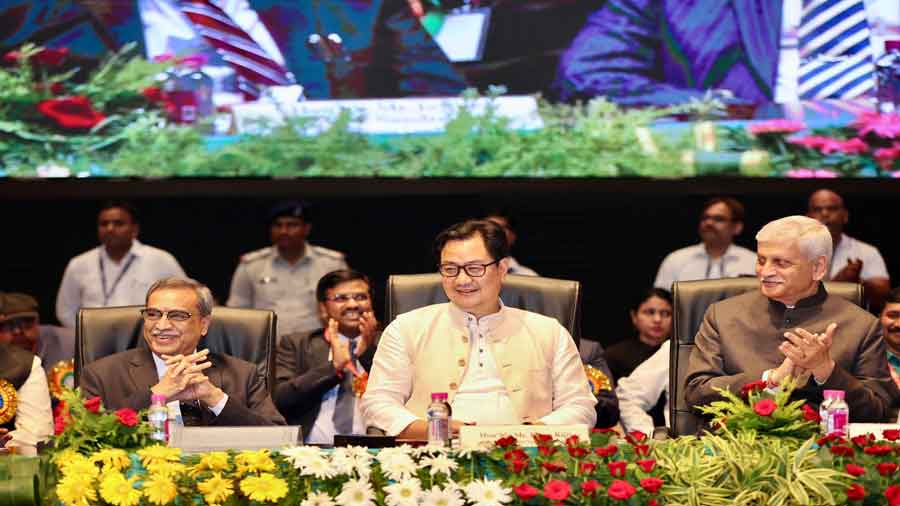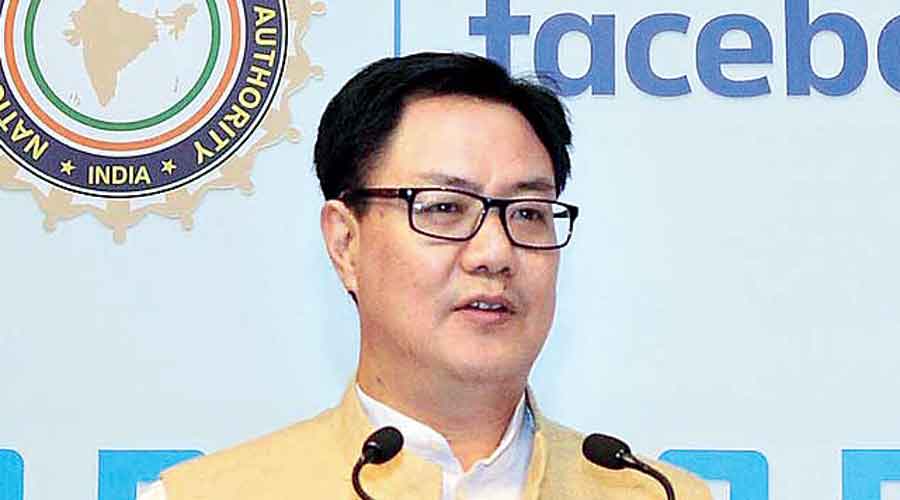Union law minister Kiren Rijiju on Saturday said in the presence of Chief Justice of India U.U. Lalit that the judiciary should work within its “boundaries” and with “mutual respect” for the executive and legislature.
The minister had made a similar statement last May, while reacting to the Supreme Court suspending the operation of the sedition law. It is unclear what the context of Saturday’s statement was. Addressing the event after the minister, Justice Lalit said that just as a lawyer says “I agree” when a verdict is passed, he too said “I agree” with everything others had said before him.
On Friday, a bench headed by the Chief Justice had agreed to list for hearing after the Dussehra break a batch of petitions challenging the abrogation of clauses of Section 370 that granted special status to Jammu and Kashmir.
“You have seen over the last eight years how the Narendra Modi government works; it has not taken any step that can damage the judiciary,” Rijiju told the national seminar organised by the Bar Council of India (BCI) in Patna.
“We want to keep the judiciary independent and strong. I say respectfully that we don’t want to undermine the judiciary in any way.” He then added: “Usi prakaar hum judiciary se bhi expect karte hain ki jo apne apne daayre mein, jo samvidhan mein rekha kheencha hua hai — judiciary, legislature, executive — hum sab apne apne daayre mein kaam karein, aur isi daayre mein reh kar ke hum ek doosre ke prati samman bhaav se kaam karenge, toh aage jaa kar ke desh ke jo teen mukhya stambha hain, aur majbooti se khada hone mein samarth hoga.”
A translation: “The same way, we expect from the judiciary that, according to the lines drawn by the Constitution — judiciary, legislature, executive — we shall all work within our boundaries; and if we work with mutual respect while staying within these boundaries, the three main pillars of the country will stand stronger.” Rijiju also outlined plans for an alternative dispute redress mechanism, causing some senior lawyers to express fear that this might represent a disguised attempt by the executive to encroach on the judiciary’s domain.
Apart from Justice Lalit, those present included Justices Sanjay Kishan Kaul, M.R. Shah, B.R. Gavai, J.K. Maheshwari and M.M. Sundresh of the Supreme Court, Patna High Court Chief Justice Sanjay Karol, Jharkhand High Court Chief Justice Ravi Ranjan, several other high court judges, senior lawyers and BCI chairperson Manan Kumar Mishra.
“We are shocked at the Union law minister’s address. What he said was anti-Constitution, an infringement on the judiciary and an attempt to impair its functioning,” Patna High Court Advocates Association president Yogesh Chandra Verma told The Telegraph.
“Such statements will lead to a decline in the people’s faith in our judicial system. Many legal luminaries have already said that our judiciary is under pressure.” Verma added: “The Constitution has conceived an independent judiciary, completely free from the influence of the executive and the legislature. The judiciary is not meant to cooperate with any other pillar of democracy because it has the power to review their decisions.”
Alternative system
Rijiju cited the country’s backlog of 4.8 crore court cases — including 60,000 in the Supreme Court and 7 lakh in the high courts — to stress the “need for a system of mobile courts to deliver speedy justice”.“We are also planning to have an alternative dispute redress mechanism. We will also make an arbitration council and a mediation council in future. It will open… new opportunities for young lawyers,” Rijiju said. He called for the use of Indian languages in the high courts and the Supreme Court.
Verma said the need for an alternative dispute redress mechanism was being felt because the judicial system was collapsing, thanks to lack of support from the government. He stressed the huge vacancies in the high courts and the Supreme Court. Justice Lalit, who had listened intently to Rijiju’s remarks, did not refer to them directly in his speech, which he kept short.
After expressing gratitude for being invited to the programme, he said: “Ek judge ke naate aisa hota hai ki faisle ke waqt wakil, judgment ke baare mein bol sakta hai ki ‘I agree’. Mujhse pehle bhi jin logon ne bola hai, judgment diya hai, uske upar main sehmati deta hoon. Main, mere se pehle jitne bhi logon ne jo kuchh bhi bola aapke saamne, main uspar muhar lagata hoon. Main bilkul un saari cheezon se agree karta hoon ‘I agree’ karke.”
Translated, this reads: “When a judgment is delivered, the lawyer can say ‘I agree’. All those who spoke before me, passed their judgment, I endorse it all. I fully agree with all of it by saying ‘I agree’.” Speaking before Rijiju and Justice Lalit, several lawyers, judges and the BCI chief touched on issues such as the pendency of cases, ethics, gender equality and the state of legal education. About 10,000 lawyers, serving and retired judges and law students from various states participated in the event, which was followed by a training workshop for young lawyers.
A senior lawyer told this newspaper on the condition of anonymity that the Centre could be planning “a parallel judicial system under the garb of an alternative dispute redress system to help corporate houses, big business and industrialists circumvent the present system to maximise profits and exploit resources”.












